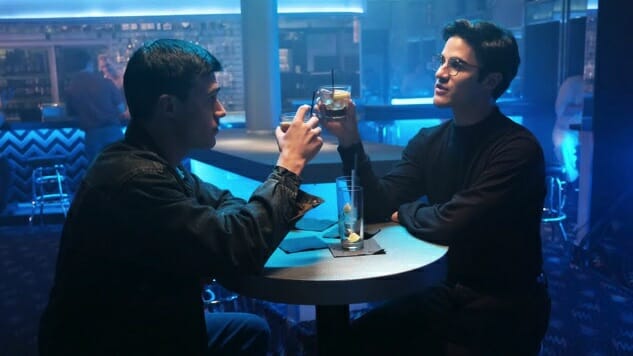American Crime Story: “Don’t Ask Don’t Tell”
The Assassination of Gianni Versace Episode 2.05
Photo by Ray Mickshaw/FX
OK: For anyone wondering if this show is going to become less heartbreaking over time? It’s looking like no.
Last week’s emotional heavyweight “House by the Lake” focused on the psychological torture and eventual murder of architect David Madson (Cody Fern). But the hint is that Andrew Cunanan (Darren Criss) got to Madson via Jeff Trail (Finn Wittrock), the man he bludgeons with a hammer in the first minutes of the episode, so we’ve been primed to expect this episode take us back to how Trail got wrapped up in this horrible spiderweb. The fifth episode of this series is the first not to have an actual murder in it, but trust me, it’s not going to make anything less painful.
“Don’t Ask Don’t Tell” is a layered meditation on uniforms and conformity, masks and unmaskings. It moves back and forth in time in a way that’s easy to track but a little hard to describe; there’s a logic to this episode that poets will recognize. It turns on symbol and metaphor at least as much as plot, and it has a lot of layers of commentary on. . .well, on the nature of identity when you get down to brass tacks.
Gianni Versace (Edgar Ramirez) arranges an interview in which he intends to come out publically. Donatella (Penelope Cruz) is annoyed (when is she not?) because she thinks her brother’s coming out might have a negative impact on sales. “Well,” her brother quips, annoyed, “we’ll still have Elton, no?” She blames Antonio (Ricky Martin). She tells Gianni it’s not only his decision; the company has to be taken into account. She reminds him (thanks, Sis) of how people stopped buying Perry Ellis’s clothes after he appeared on the runway so ravaged by AIDS his models had to help keep him on his feet. “Probably his most important show,” Versace remarks. He calmly makes it clear to Donatella that he’s done hiding, that after his own brush with mortality he intends to spend the rest of his life being who he is. Nothing in the closet here (except a lot of very loud print fabrics).
Meanwhile, Jeff Trail is working a manual labor job and loses it when a fellow vet asks why a career-track Annapolis graduate left the Navy. He has this friend-friend-plus?—an architect named David. They both get the news that Andrew’s coming into town. It’s not good news; they both have a past with him. Jeff takes evasive maneuvers, bunking with his pregnant sister, who urges him to come out to their parents. David’s left to deal with Andrew, who gives him a gold watch, proposes marriage, says he’s “a whole new person.” (He’s emphatically not a whole new person: Same sociopath, different day.) After David turns down his marriage proposal, he lets himself into Jeff’s apartment, rummages through his clothes, finds Jeff’s dress whites meticulously folded in a box along with his gun and a VCR tape. Wearing Jeff’s dress hat, Andrew watches the video, which contains interview footage that, as Jeff notes on camera, will probably end his career. The interview is about being gay in the military in the “Don’t Ask, Don’t Tell” era. “They know,” he says. “I saved a sailor’s life once, they were beating him to death because he was gay. I did a good thing, the bravest thing I’ve ever done. And I can’t tell you how many times I’ve dreamed about taking that moment back, and letting him die, so they wouldn’t know about me.”
We flash back two years, to the incident described in the interview. Trail’s an officer with a good record and a bright future-until essentially outs himself by comforting the badly hurt and completely terrified victim of the beating in view of another officer. In the soul-searching that follows, Trail receives veiled and not-so-veiled threats, attempts an at-home tattoo removal, is given a truly freaky-looking “don’t ask don’t tell” primer presented in the form of a comic book, and attempts to hang himself but can’t go through with it. Eventually Trail goes into a gay bar. A young man in glasses notices him. “First time?”
-

-

-

-

-

-

-

-

-

-

-

-

-

-

-

-

-

-

-

-

-

-

-

-

-

-

-

-

-

-

-

-

-

-

-

-

-

-

-

-








































